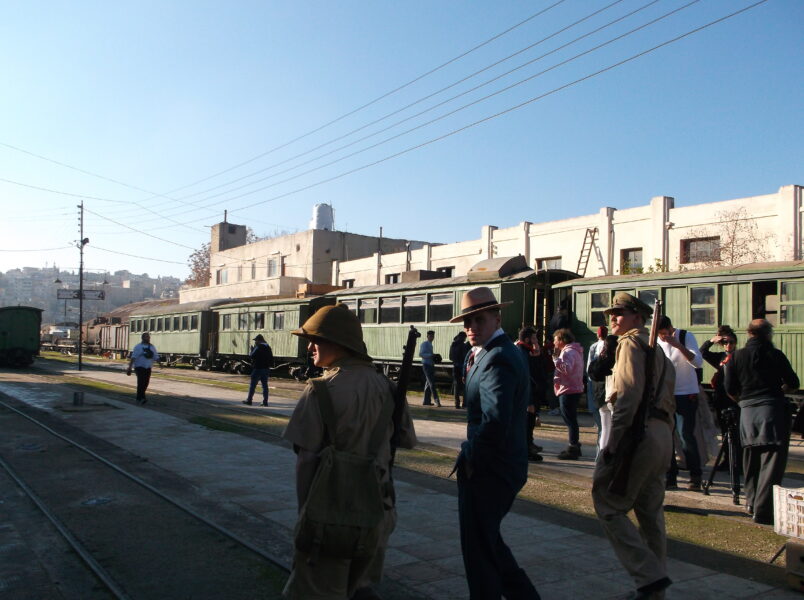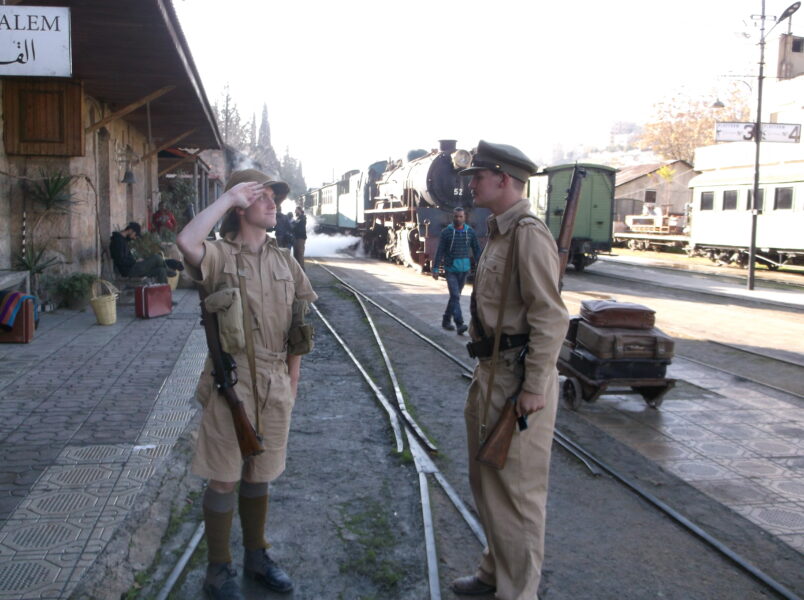
The fairly scruffy advertisement taped to a wall outside a kebab shop in the trendy neighbourhood of Jabal al-Weibdeh read: “Looking for male British/Irish actors in Amman, Jordan during December. Age: 18- 30. Role: soldier/featured extra.”
In terms of nationality and age, I fit the bill perfectly. The sole thing that I lacked was the not-insignificant quality of actually being an actor. True, I had excelled in a memorable performance as the front half of Rudolph the reindeer in a primary school production of Jack and the Bean Stalk (yes, you read that correctly). Nonetheless, “actor” was probably a bit of a stretch. Unfazed, I applied anyway.
Within an hour, I got a call from a casting agent called Nizar who enthusiastically informed me that the director would love to have me on board. “Do have any questions about the project?” I did have a fairly crucial one: “What is the project…?”
It turned out that I hadn’t signed up to act in a low-budget student production as I had supposed, but instead a feature film directed by the acclaimed Palestinian director Annemarie Jacir. The film revolves around the events of the 1936 Arab revolt in Palestine, and I would be playing a soldier in the occupying British army. No further information was forthcoming, not even the name of the film.
The film revolves around the events of the 1936 Arab revolt in Palestine, and I would be playing a soldier in the occupying British army.
A few days later, I was picked up from my house to be taken to the fitting where I donned my uniform and some exceptionally uncomfortable helmets. I wasn’t too happy to have my beard of four month’s growth shaved off but was even less happy to be left with a very outdated moustache. With the skin fade complete, I looked the very picture of a 1930s British soldier. Though I had originally been told that the shoot would start at 5AM to make the most of the daylight, Nizar had failed to mention that this entailed being whisked off to the set at 3:30 on Friday morning. Filming was to take place at the old train station at Marka which contains a working steam train and plenty of 1930s décor.
Until then, I had been very confused as to why, a few days prior, Nizar had called me again to ask if I’d be willing to take a speaking role. I’d accepted – the pay was triple that of a standard extra – but felt strongly that I probably wasn’t the most suitable candidate for the role. Had Annemarie perceived some until-now hidden acting talent in my application video?
As I got chatting to the other extras, I quickly worked out that it had more to do with my accent than my acting. Our squadron consisted of 6 British-passing Jordanians and one American, making me the only genuine Brit. Luke and Hamza, two of my comrades-in-arms, explained that they’d practiced the English accent for days prior to their audition but couldn’t convince casting to give them the speaking role. I didn’t have the heart to tell them that I’d nabbed it without even attending an audition.
That was one mystery cleared up, but I still didn’t know what I was actually going to be saying. I feared that at any minute someone would hand me a dense script that I’d be expected to learn on the spot. First however, I had to let hair and make-up do their work. An order came from above that my character wouldn’t be sporting a moustache, so off it came. I was partially relieved and partially irritated that I’d had to walk around in public with it for no reason at all.

According to Luke, the French head of make-up Bernard had been overheard telling an assistant to “fetch me the lifeless-looking Englishman, I want to put some colour on him.” Having sat me down in the trailer, he followed this plan very literally, applying a thick layer of orange to my face and neck. Post-varnishing, my reflection in the lightbulb-bordered mirror was evocative of a star from The Only Way is Essex. “You simply didn’t look like you’d been in the Middle East for months,” Bernard explained. “But I have been in the Middle East for months!” I protested, realising that that made my paleness even less justifiable.
After a bit more waiting around, the other soldiers and I were taken to the first filming location, Paris Circle in Jabal al-Weibdeh, which had been decked out with Union Jacks, old cars and a horse and cart. The scene was very straightforward: the protagonist looks into a shop while in the background an armoured vehicle full of British soldiers drives past. I don’t really know why it took so many hours to film what can surely make up for no more than 20 seconds in the film.
We then drove back to the train station where I was given additional props and a microphone hidden in my helmet. Hamza would be joining me as an ID checker, so we were taken by one of the production assistants (who I realised had played Layan’s brother in the Jordanian series Al-Rawabi School for Girls) to meet the director. She was very friendly, and I was able to tell her how much I loved her film The Salt of this Sea.
I needn’t have worried about learning my lines. I only had one: “You! Identification!” It took a few attempts to find a volume Annemarie was happy with. However, I could see in her eyes that she thought the much-taller Hamza looked much more intimidating than me.
“Hamza, would you mind giving the line a try?” He cleared his throat. “You. Identification!” he barked in an unmistakeably Jordanian accent. She admitted that I was more convincing. But before we could start, she had to ask me something. “Is that your… natural skin tone?”
Bernard had to be summoned. “I know what the problem is,” he announced confidently. “You want his arms to match his face!”
His annoyance at having to wipe away his work was evident in the rather rough way in which he did so once we were back in the trailer. Looking once again like the lifeless Englishman that I’d arrived as, I was put in position by the station’s exit where I would accost the leading man, check his ID and then let him go without a word.
We did the scene in full about ten times, and then just the dialogue from different angles and with close ups. The Enfield Mark-1 rifle on my shoulder was heavy, and standing around for almost hours did get quite tiring. Luckily, we were given some lunch, which I ate on the train with the other extras with whom I developed a soldierly comradery. A few more takes later and it was a wrap, allowing us to take a rest while we waited to be taken back home.
The experience was obviously great fun, but it was educational too. In my small scene, I was briefly transported a century back in time and in my disdainful and arbitrary treatment of the Palestinian protagonist, I got a glimpse into the colonial mentality that defined the relationship between people from my country and his at that time. In the small act of transforming myself to become uncharacteristically callous, I mirrored the transformation that young British men would have had to have undergone in order to play their part in Britain’s colonial domination of Palestine and elsewhere. It was an uncomfortable reminder of how unrecognisably different my time in Jordan would have been had I been born a few generations earlier.


